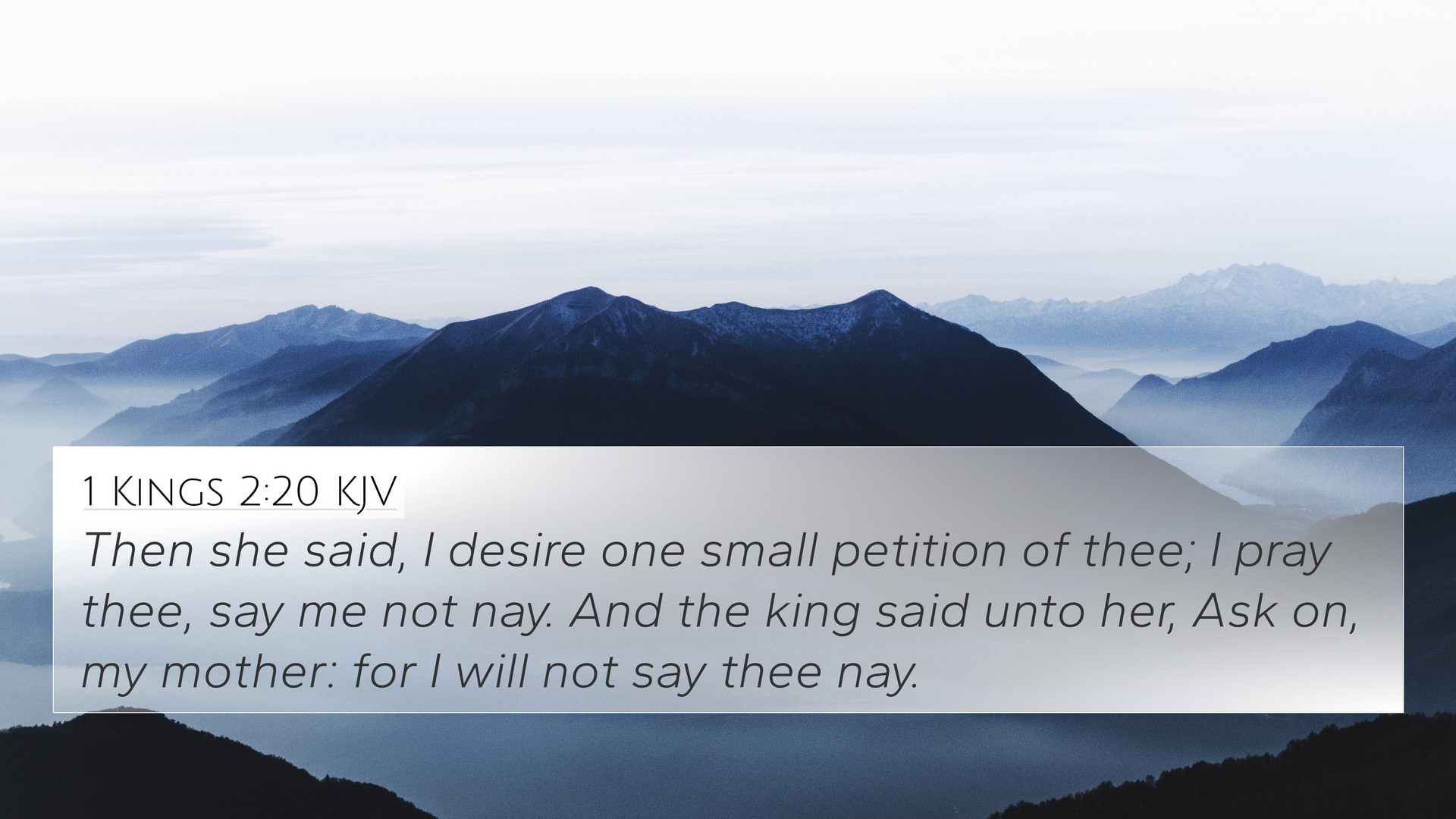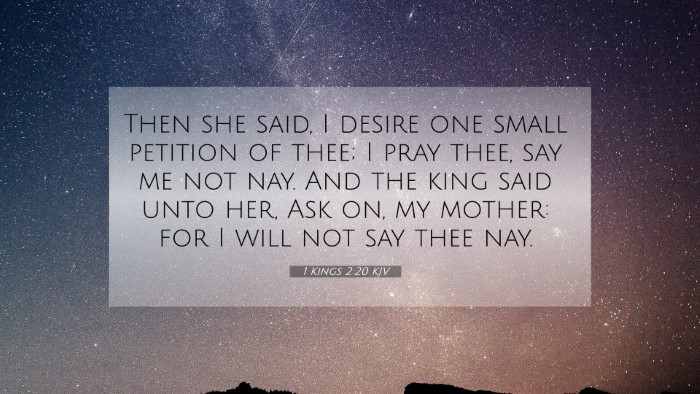Understanding 1 Kings 2:20
Verse: "Then she said, I desire one small petition of thee; I pray thee, say me not nay. And the king said unto her, Ask on, my mother: for I will not say thee nay." (1 Kings 2:20)
Summary of the Verse Meaning
In this verse, we witness a dialogue between King Solomon and his mother, Bathsheba. Bathsheba approaches Solomon with a request, emphasizing her desire that it be granted without refusal. The verse encapsulates themes of authority, familial respect, and the nature of royal petitions.
Insights from Public Domain Commentaries
Matthew Henry’s Commentary
Henry notes that Bathsheba’s request is significant because it reflects both her royal status as the mother of the king and the customary channel of approach to a king. The phrase "say me not nay" indicates her humility and the respect she has for Solomon's authority. Henry emphasizes the need for wisdom in our petitions, advocating for heartfelt honesty in our requests to God and those in positions of power.
Albert Barnes’ Notes on the Bible
Barnes comments on the cultural context of the verse, indicating that it was common for queens or mothers of kings to intercede for their requests. He draws attention to Solomon's willingness to listen to his mother and how this reflects his character as a just and compassionate ruler. Barnes also highlights that the king's promise not to deny her request is emblematic of the gracious nature needed in leadership.
Adam Clarke’s Commentary
Clarke provides deeper insights into the specific request Bathsheba makes, which leads the reader to explore the surrounding context. He understands the statement as an indicator of Bathsheba's boldness and her care for her son's reign. Clarke argues that Solomon's response is a necessary reminder for leaders about the importance of compassion toward their close relatives.
Thematic Connections and Bible Verse Cross-References
This verse connects with several notable passages within the Bible, enriching our understanding of relational dynamics in biblical narratives:
- 1 Samuel 16:1: God instructs Samuel to anoint David as king, setting the stage for future royal dynamics.
- 2 Samuel 12:1-14: Nathan's prophecy to David showcases the weight of kingship and the importance of heeding wise counsel.
- Proverbs 1:8-9: Proverbs emphasizes the importance of listening to parental guidance, resonating with the mother-son relationship in this verse.
- Matthew 15:4: This verse shows Jesus affirming honor for one's parents, which reflects the respect Solomon shows towards Bathsheba.
- 1 Kings 1:11-21: The earlier political intrigue surrounding Solomon's rise to power gives context to this plea and its emotional stakes.
- Romans 13:1: A reminder that all authority is instituted by God, affirming the response of Solomon as a rightful ruler.
- James 1:5: Encouragement to ask for wisdom, mirroring Bathsheba’s request for Solomon and his wise governance.
Inter-Biblical Dialogue
Understanding this verse further is enriched by an analysis of its implications throughout the scriptures, revealing how royal and familial interactions set precedent for leadership dynamics in the Bible. The interaction between Bathsheba and Solomon is not only a moment of personal petition but is reflective of broader themes of governance, authority, and familial interconnectedness throughout the scriptures.
Conclusion
In 1 Kings 2:20, we find profound insights into the nature of leadership, maternal influence, and the importance of listening. This verse serves as a reminder of the essential values of respect, wisdom, and compassion, relevant not only for kings but also for all in positions of authority.
Further Study and Cross-Referencing
Utilizing tools for biblical cross-referencing allows for a deeper understanding of related verses. Engaging with Bible concordance and cross-reference guides can illuminate connections between different scriptural themes. By exploring how different scriptures relate to each other, one can enhance both personal study and preparation for teaching:
- How to find cross-references in the Bible
- Identifying connections between Old and New Testament
- Comparative study of Pauline epistles
- Cross-referencing Psalms with New Testament teachings











